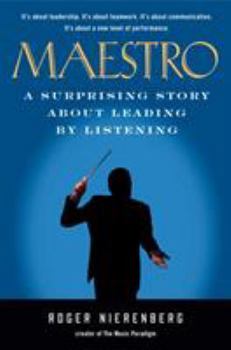Maestro: A Surprising Story about Leading by Listening
Select Format
Select Condition 
Book Overview
A conductor reveals powerful leadership lessons by explaining the inner workings of a symphony orchestra Roger Nierenberg, a veteran conductor, is the creator of The Music Paradigm, a unique program... This description may be from another edition of this product.
Format:Hardcover
Language:English
ISBN:1591842883
ISBN13:9781591842880
Release Date:October 2009
Publisher:Portfolio
Length:128 Pages
Weight:0.50 lbs.
Dimensions:0.7" x 5.6" x 8.6"
Age Range:18 years and up
Grade Range:Postsecondary and higher
Customer Reviews
5 ratings
Enjoyed it
Published by Thriftbooks.com User , 14 years ago
This is a fairly short, fun "lesson" in effective listening and how it plays into better leadership. If you're a fan of business fables, you'll enjoy this one as well. The story surrounding the lesson is unique and the entire book keeps going at a good pace and holds your interest.
In tune with management-Conductor style
Published by Thriftbooks.com User , 14 years ago
Nierenberg demonstrates how a conductor allows the members of the orchestra to work out their differences to find an even point with leadership and employees without the typical pecking order in most companies today. I found a direct correlation between how an orchestra as parts must come together to be successful at what they do as a core group. Any head of a department would benefit from reading Maestro to get a better work results and improve relationship with co-workers so they would want to improve their performance in the work place without being strong armed by management.
An Unexpected But Very Useful Analogy
Published by Thriftbooks.com User , 14 years ago
This amazing book allows one to learn more about both orchestras and leadership. When I first approached this book, I was skeptical. But, over this relatively short book (only a little over a hundred pages), my concerns were all raised and addressed. While this book did cover much that I had learned elsewhere, it did give me a new appreciation for some of that, and went on to present some ideas that were new to me. My favorite lesson was that, as a conductor does in an orchestra, a business leader has a perspective that is fundamentally different from those he leads. This is not only due to his looking in a different direction, but also because he hears things differently. Many times as a leader, I had not realized this and expected those whom I led to see what I saw. This book has definitely improved my leadership skills.
"Sound" leadership advice
Published by Thriftbooks.com User , 14 years ago
Although this is the third parable-style management book that I've read recently, it really struck a note with me. The maestro does not actually play any instrument but he is the one who pulls it altogether. The maestro's job is to ensure that everyone is listening to each other, that the horns aren't outplaying the woodwinds or strings, that the musicians "own" the music, and then to listen to the results, make the tweaks, and to inspire the final outstanding performance. This is not unlike most business organizations. We've all worked in situations where the department that squawks the loudest is not necessarily the most important or at least not the current priority. Leading is a matter of cajoling, providing feedback (both positive and negative) and inspiring people to perform their best. Management is basically a method of getting things done. Good managers are not necessarily good leaders. This book makes that distinction clear. My particularly favorite chapters were: Lead, Don't Cheerlead - Don't Oversee Every Note - and Hear the Clarinet. Even if you are not a musician or in the music world, I would recommend this book for anyone interested in developing leadership qualities.
A very useful book
Published by Thriftbooks.com User , 14 years ago
The scene is set with the narrator, the head of a company in a meeting with several department heads, discussing recent failures. Finance, sales, and production blame each other for losses. With this discussion heavy on his mind, the narrator goes home during his daughter's violin lesson and overhears the violin teacher telling the girl about the fantastic new orchestra director he is now working under. The violinist invites the CEO to a rehearsal, and fascination to how well an orchestra holds together under the director's baton grows into deep understanding of much more than music. The dangers of micromanagement, wrong perspectives, and not listening properly are spelled out in an interesting series of lessons during subsequent rehearsals. The CEO is able to present a new dimension of working as a productive team to 250 employees in a dramatic way. As a musician, I like the book in its obvious references to music and musicianship. Sometimes, I wondered if non-musicians would "get it", though it is written in a very easy to read style. Mostly I had to think about my principal, a micromanager, who I would very much like to read it! Written by a musician, but by someone who is giving himself the position of an industrialist, I have to think that the leader of any type of team or business could benefit by the metaphors constantly brought up to make all work "in perfect harmony". It spells out the importance of the individual, and how a leader can bring out the best cooperation while bringing out the innovative ideas of others.




